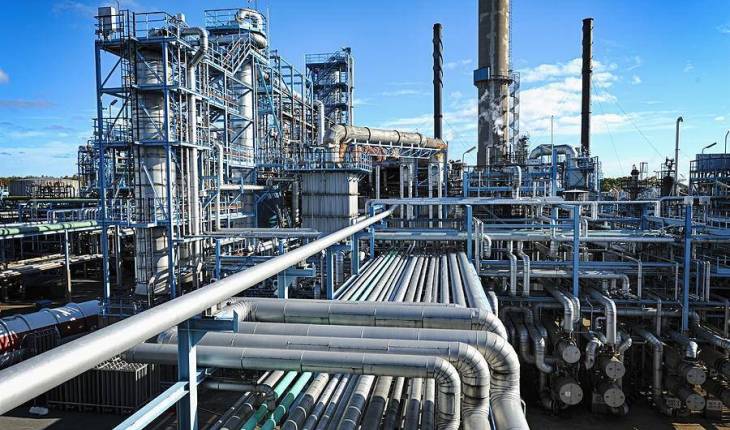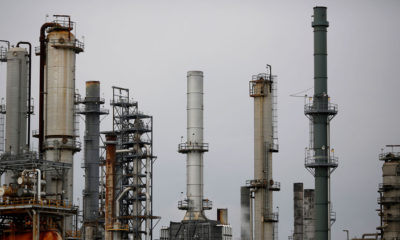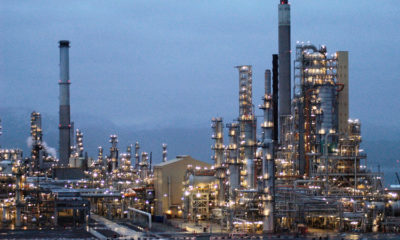- Refineries Lose N231bn Under Buhari Amid Delayed Repairs
The nation’s refineries suffered huge losses in the first four years of President Muhammadu Buhari’s administration as they were left in a state of disrepair, ’FEMI ASU writes
Federal Government-owned refineries, located in Port Harcourt, Kaduna and Warri, lost over N231bn in the last four years as the proposed rehabilitation of the plants suffered a setback.
The Port Harcourt Refining Company has two refineries, while the Warri Refining and Petrochemical Company and the Kaduna Refining and Petrochemical Company have one each.
The refineries lost N34.57bn from June to December 2015; N8.64bn in 2016 (data for January to August showed); N47.19bn in 2017, and N132.51bn in 2018, according to the Nigerian National Petroleum Corporation.
When President Muhammadu Buhari assumed office on May 29, 2015, all the refineries were not processing crude oil, with Port Harcourt refinery sitting idle since January of that year while Warri and Kaduna stopped refining in February of the same year, according to available data from the NNPC.
In 2015, Port Harcourt, Kaduna and Warri refineries were idle for eight months, seven months and nine months, respectively, losing N10.05bn, N36.03bn and N21.39bn.
Warri refinery was idle for five months in 2016; KRPC did not refine crude for six months, and PHRC was only idle in September.
In 2017, Kaduna, Warri and Port Harcourt refineries were idle for six, five and two months, respectively, losing N32.61bn, N22.14bn and N11.51bn.
Kaduna refinery did not process crude oil for 11 months in 2018, while Port Harcourt and Warri were idle for seven and three months respectively, losing N31bn, N59.96bn and N41.71bn.
According to the latest data from the NNPC, Kaduna and Port Harcourt refineries remained idle in January this year.
The refineries have a combined installed capacity of 445,000 barrels per day but have continued to operate far below the installed capacity for many years.
The NNPC had planned to rehabilitate the refineries in order to attain a minimum of 90 per cent capacity utilisation, using third-party financiers and the original refinery builders to provide the requisite funding and technical support.
The corporation, its transaction advisers and an inter-ministerial team on refineries rehabilitation, were said to have reviewed expressions of interest from 28 potential financiers.
But after over one and half years, the negotiations with financiers stalled in December 2018 due to varying positions on key commercial terms.
The NNPC said it had abandoned the strategy of seeking offshore funding due to ‘onerous conditions’ demanded by the proposed financiers.
It said it had to resort to immediate direct funding from internal cash flows and debt financing from the financial markets for the rehabilitation project.
On March 21, 2019, the corporation announced the commencement of the first phase of the rehabilitation of the 210,000 bpd capacity Port Harcourt Refinery complex, comprising the 60,000 bpd old refinery built in 1965 and the 150,000bpd new refinery inaugurated in 1989.
It said the project would be executed by Milan-based Maire Tecnimont S.p.A, in collaboration with its Nigerian affiliate, Tecnimont Nigeria.
The Group Managing Director, NNPC, Dr Maikanti Baru, was quoted as saying that at the end of phase 1, the refinery complex should be able to reach 60 per cent capacity utilisation.
The national oil firm said the first phase of the rehabilitation contract, which would run for six months, would involve detailed integrity check and equipment inspection of the Port Harcourt refinery complex beginning from the end of March 2019.
The second phase of the rehabilitation project, which entails a comprehensive revamp of the complex,is aimed at restoring the refinery to a minimum of 90 per cent capacity utilisation.
In November last year, the then Minister of State for Petroleum Resources, Dr Ibe Kachikwu, said the plan to get the ailing refineries to work at almost full capacity would not materialise by 2019.
Earlier on May 4, 2017, the NNPC expressed the commitment to actualise the December 2019 target set by the Federal Government to end the importation of petroleum products into the country.
It said on January 23, 2018, that it was inching closer to arriving at the choice of financiers for the refineries, with the Group Managing Director, Dr Maikanti Baru, saying the agreements on the potential financiers for the refineries were being fine-tuned.
But the NNPC announced in early February that it could not agree with the investors on the commercial terms of the transaction.
Between 1976 and 1989, the Federal Government, through the NNPC, built refineries in Port Harcourt, Warri and Kaduna, in addition to an existing refinery in Port Harcourt, which was built by Shell in 1965 (but later bought over by the NNPC).
But the state of the 445 million-bpd refineries has worsened over the years and no new refinery has been built by the government since 1989, making the country to rely heavily on imports to meet fuel demand.
“We just have to look for ways to ensure adequate internal refining. The advantage of internal refining is that we will have sufficient petroleum products. There is no reason why a litre of kerosene or diesel should cost above N200,” a petroleum expert, Mr Bala Zakka, told our correspondent.
He said the country had been relying on fuel imports for many years, adding that adequate domestic refining would help the country free itself from foreign currency pressure.
Kachikwu said last week, “If you look at the refineries, the first problem we had was that they were not functioning when I assumed office in 2015 and because of the huge apparent fuel scarcity, it was a major problem for me if I had to wait for vessels to arrive each time to meet the delivery timeline. These were the problems. So, I was focused on how to get them working, at least to start, no matter how little and all they gave me was one million litres a day.
“The pipelines that were supplying fuel had all been destroyed and they had entered into a contract before we came in, to supply product by vessels. The cost of those vessels supplied was more than the value of the crude oil that was being supplied. It did not make any financial sense. So, I cancelled that and challenged Nigerians who were in this entity to go and use their money to repair the pipelines.”

 Billionaire Watch3 weeks ago
Billionaire Watch3 weeks ago
 Startups4 weeks ago
Startups4 weeks ago
 News4 weeks ago
News4 weeks ago
 News4 weeks ago
News4 weeks ago
 Bitcoin4 weeks ago
Bitcoin4 weeks ago
 Naira4 weeks ago
Naira4 weeks ago
 Forex3 weeks ago
Forex3 weeks ago
 Treasury Bills4 weeks ago
Treasury Bills4 weeks ago























